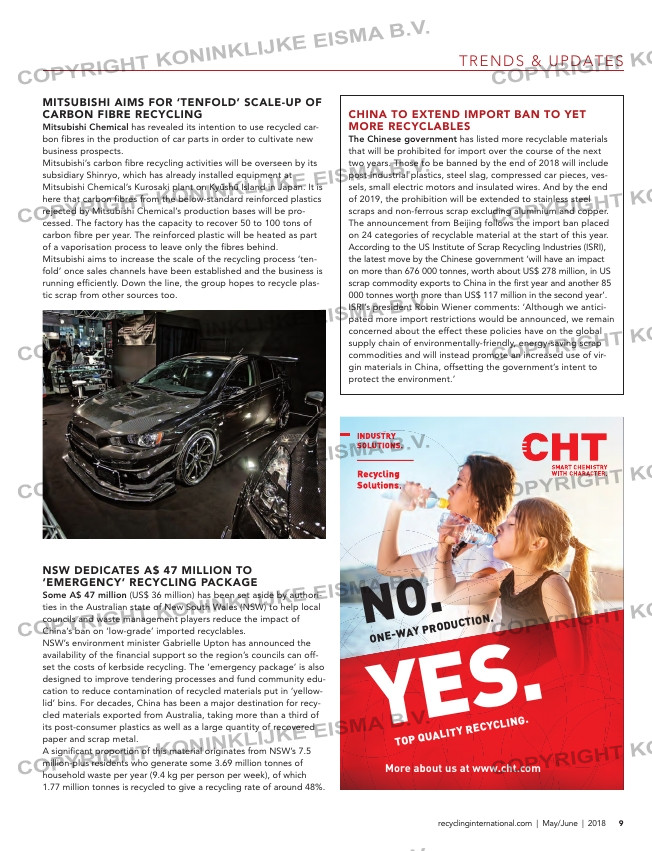Page 9 from: May / June 2018

9recyclinginternational.com | May/June | 2018
TRENDS & UPDATES
NO.
ONE-W
AY PRO
DUCTIO
N.
YES.
TOP QU
ALITY R
ECYCLI
NG.
More about us at www.cht.com
CHT_Anz_Recycling_100x132_180406.indd 1 06.04.18 10:21
NSW dedicateS a$ 47 millioN to
‘emergeNcy’ recycliNg package
Some A$ 47 million (US$ 36 million) has been set aside by authori-
ties in the Australian state of New South Wales (NSW) to help local
councils and waste management players reduce the impact of
China’s ban on ‘low-grade’ imported recyclables.
NSW’s environment minister Gabrielle Upton has announced the
availability of the financial support so the region’s councils can off-
set the costs of kerbside recycling. The ‘emergency package’ is also
designed to improve tendering processes and fund community edu-
cation to reduce contamination of recycled materials put in ‘yellow-
lid’ bins. For decades, China has been a major destination for recy-
cled materials exported from Australia, taking more than a third of
its post-consumer plastics as well as a large quantity of recovered
paper and scrap metal.
A significant proportion of this material originates from NSW’s 7.5
million-plus residents who generate some 3.69 million tonnes of
household waste per year (9.4 kg per person per week), of which
1.77 million tonnes is recycled to give a recycling rate of around 48%.
chiNa to exteNd import baN to yet
more recyclableS
The Chinese government has listed more recyclable materials
that will be prohibited for import over the course of the next
two years. Those to be banned by the end of 2018 will include
post-industrial plastics, steel slag, compressed car pieces, ves-
sels, small electric motors and insulated wires. And by the end
of 2019, the prohibition will be extended to stainless steel
scraps and non-ferrous scrap excluding aluminium and copper.
The announcement from Beijing follows the import ban placed
on 24 categories of recyclable material at the start of this year.
According to the US Institute of Scrap Recycling Industries (ISRI),
the latest move by the Chinese government ‘will have an impact
on more than 676 000 tonnes, worth about US$ 278 million, in US
scrap commodity exports to China in the first year and another 85
000 tonnes worth more than US$ 117 million in the second year’.
ISRI’s president Robin Wiener comments: ‘Although we antici-
pated more import restrictions would be announced, we remain
concerned about the effect these policies have on the global
supply chain of environmentally-friendly, energy-saving scrap
commodities and will instead promote an increased use of vir-
gin materials in China, offsetting the government’s intent to
protect the environment.’
mitSubiShi aimS for ‘teNfold’ Scale-up of
carboN fibre recycliNg
Mitsubishi Chemical has revealed its intention to use recycled car-
bon fibres in the production of car parts in order to cultivate new
business prospects.
Mitsubishi’s carbon fibre recycling activities will be overseen by its
subsidiary Shinryo, which has already installed equipment at
Mitsubishi Chemical’s Kurosaki plant on Kyũshũ Island in Japan. It is
here that carbon fibres from the below-standard reinforced plastics
rejected by Mitsubishi Chemical’s production bases will be pro-
cessed. The factory has the capacity to recover 50 to 100 tons of
carbon fibre per year. The reinforced plastic will be heated as part
of a vaporisation process to leave only the fibres behind.
Mitsubishi aims to increase the scale of the recycling process ‘ten-
fold’ once sales channels have been established and the business is
running efficiently. Down the line, the group hopes to recycle plas-
tic scrap from other sources too.
06-07-09-10-12-13-14_trendsupdates18ad.indd 9 24-04-18 16:30



